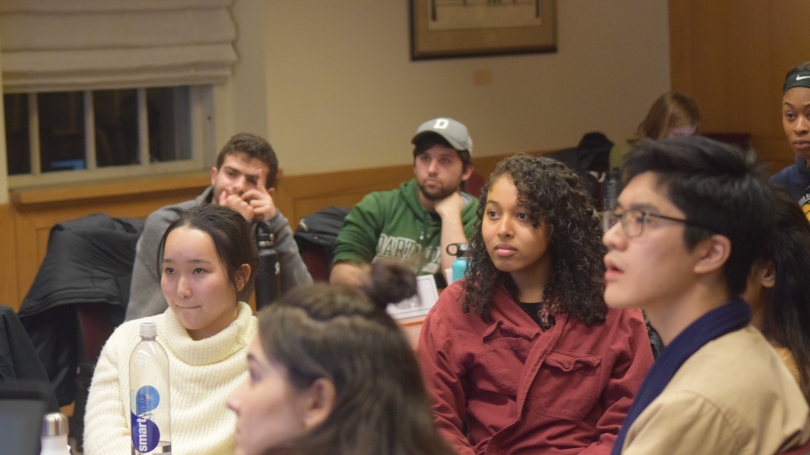
- Public Policy
- Leadership
- Funding
- News & Events
- About the Center
Back to Top Nav
Back to Top Nav
Back to Top Nav
Back to Top Nav
On February 6, we were joined by professor Sonu Bedi, a professor in the Government department and Director of the Dartmouth Ethics Institute. Professor Bedi’s research focuses on issues of constitutional legal theory, identity, and justice.
For the session, we read professor Bedi’s paper, How to Frame Three Hard Cases: Abortion, Same Sex Marriage, and Affirmative Action to prepare for a discussion of how to best frame these issues. Professor Bedi taught us about various ethical and conceptual principles important to framing controversial issues like abortion, same sex marriage, and affirmative action. We explored our analysis of these issues by considering how the judicial system has approached them, with our key takeaway being that the vague language of “rights” does not structure these debates in as constructive of a manner as structuring these debates on hard facts. To arrive at this key takeaway, we first broke into groups, each of which focused on one of the three aforementioned issues. Then, within each group, we summarized the legal arguments for and against abortion, same-sex marriage, and affirmative action. After our discussion in groups, professor Bedi asked each group to summarize their conclusions to the entire group. This was the easy part. The hard part was when professor Bedi pushed us to look beyond vague arguments about the “rights” of those on each side of each issue to instead break each argument down to its core fundamentals. Once we had the fundamentals, it was much easier to compare one side’s argument to the others.
I found today’s session with professor Bedi very useful, because as someone very interested in politics and discussing controversial yet important issues, I found professor Bedi’s lesson on how to frame difficult conversations to be interesting and applicable to my life and leadership future.
-Written by Vinay Reddy, Class of 2020 Rockefeller Leadership Fellow
As Rockefeller Leadership Fellows, seniors gain a better understanding of the qualities and responsibilities expected of leaders. As Fellows take part in the workshops, dinner discussions, and team-building exercises, they examine their skills, qualities, and attributes as leaders and analyze how these influence teamwork and achieving goals.